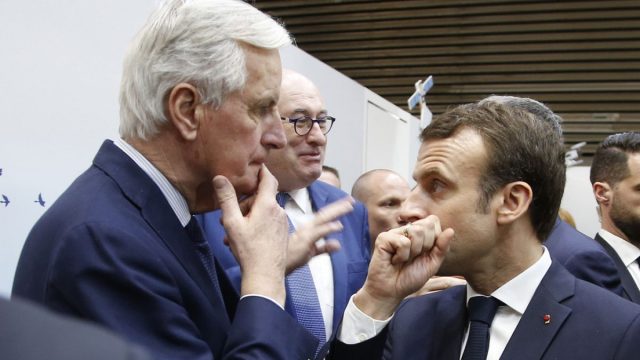French President Emmanuel Macron appointed Michel Barnier as the country’s new prime minister this Thursday. But can ‘Monsieur Brexit’ resolve France’s political deadlock?
After seven weeks of waiting, Michel BarnierEU negotiator for Brexit and veteran of the traditional right-wing party The Republicans (LR), has been appointed new prime minister from France.
Barnier now faces the complicated task of forming a government and survive a motion of censure in Parliament, divided into three blocs since Macron called early parliamentary elections in July.
Although in recent days other possible names of candidatesby choosing the conservative figure, Macron wanted to ensure that the far-right party National Group (RN) was not going to immediately vote against a Government led by Barnier.
The National Group has 126 deputies (not counting the 16 of Eric Ciotti’s rebel right-wing factionwho recently allied with Le Pen), making her the third political force of Parliament.
The centrist presidential side has 166 deputies and the left-wing coalition New Popular Front (NFP), con 193. The absolute majority is 289 seats.
Since the NFP already stated that it would vote against any prime minister that did not belong to their ranksMacron had to find a person who could appease the far right.
“Barnier’s choice is the result of a political calculation which takes into account the election of the National Rally: Barnier is a compromise candidate,” explains Philippe Moreau-Chevrolet, professor of Political Communication at Sciences-Po University.
“He is someone who suits the extreme right and? could reach compromises with the leftbecause it is a expert negotiator“Moreau-Chevrolet said in an interview with ‘Euronews’.
When Barnier’s name was announced, the leader of the National Rally, Marine Le Pensaid that his party would wait to examine your program first. “Michel Barnier seems to meet at least the first criterion we asked for, that is, someone respectful of the different political forces and capable of addressing the National Group,” he said in an interview republished on X, the former Twitter.
But this leaves some experts and MPs within the presidential camp wondering why Macron’s party insisted on blocking the rise of the far right by uniting with other parties during the parliamentary elections to end up opening the door the same party they vilified for months.
“For weeks, they appealed to the Republican front and then They ended up agreeing with the National Group. It’s a bit of a denial of democracy,” jokes Virginie Martin, political scientist and professor at the KEDGE business school.
A prime minister unwilling to lurch
In addition to the possibility of surviving a vote of confidence in Parliament, the profile of Barnier is not considered a threat on the presidential side. Barnier is unlikely to repeal key Macron reforms, such as the controversial pension plan, or roll back the asylum-immigration law, as the left-wing coalition claimed he would do if he were nominated.
“Barnier allows the continuity of Macron’s right-wing policies. Obviously, it also gives Macron the power to impose his choice on future ministers,” Moreau-Chevrolet said.
“The election gives a lot of power to the presidential side and the right-wing conservative party The Republicans (LR). They are the main winners in this matter,” said Virginie Martin.
Barnier, 73 years old, is the oldest prime minister of the modern political history of France. His age means he will not compete with those within Macron’s camp preparing for the next presidential election in 2027.
A reassuring profile for Brussels
Twice EU commissioner and architect of the Brexit agreementsBarnier knows the machinery of Brussels like no one else.
“His great sense of commitment and his experience, especially in the financial field, make him a reassuring prime minister in the eyes of the EU institutions and the Member States,” says Thierry Chopin, special advisor at the Jacques Delors Institute and visiting professor at the College of Europe.
If Barnier’s Government passes the confidence vote, it will have to get to work. First of all, France must present to the EU its proposals to cut public spending before September 20, although that deadline can be extended until October.
To meet EU rules, France would have to make cuts in at least 30,000 million euros in 2025. So, the October 1 must be presented to Parliament national budget project to 2025at a time when the country’s public finances are going through serious difficulties.
“Barnier comes from the conservative rightwhich insists on the need to cut public spending and rebalance the country’s budget. His profile could reassure the German and Dutch partners, who tend to closely follow budgetary issues within the community bloc,” says Chopin.







